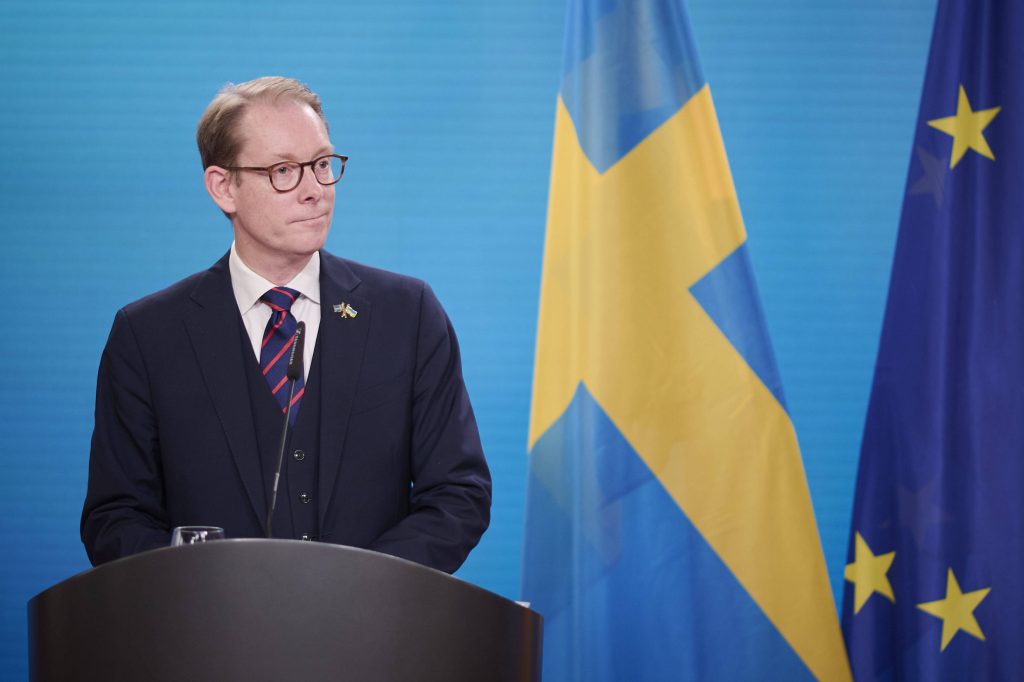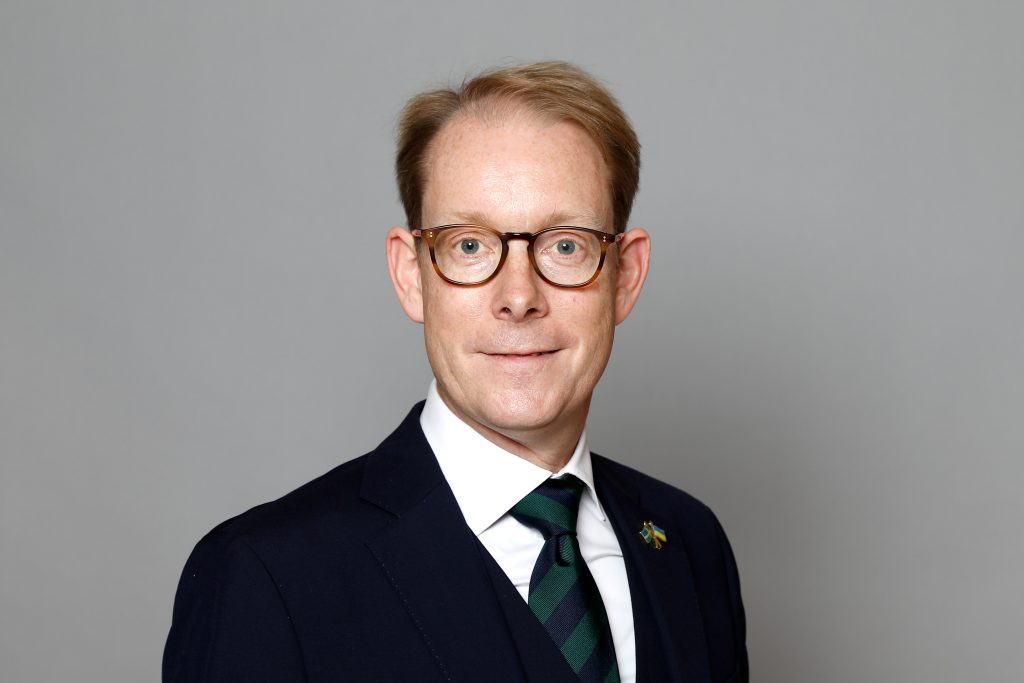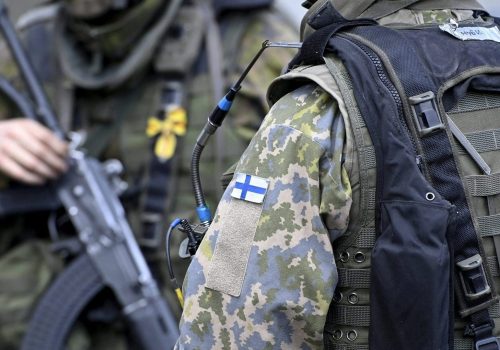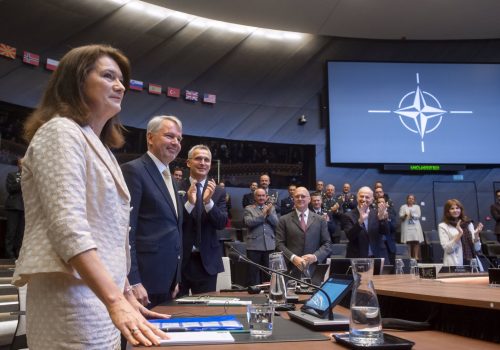Watch the full event
Just weeks after the October formation of a new center-right coalition government, Sweden will take over the presidency of the European Union (EU) in January. And Minister of Foreign Affairs Tobias Billström says that under Sweden’s leadership, the bloc “needs to be stronger.”
Billström explained Wednesday at an Atlantic Council Front Page event co-hosted by the Council’s Europe Center and Transatlantic Security Initiative that the EU needs strengthening on several fronts. First, as shown by Russia’s aggression in Ukraine, the EU must work with NATO to build a “robust defense” and “credible [deterrent]” against aggression on the continent. “The EU and NATO should augment, not compete, with each other,” he argued.
Another task is consolidating democratic values, which can be done by keeping the EU’s door open to Ukraine, Moldova, and countries in the western Balkans, Billström explained.
And in response to today’s climate and economic crises, Billström said Sweden will push the EU to address climate change and improve trade ties with the United States, which he called “the most important trade relationship in the world.” Billström pointed to the EU-US Trade and Technology Council, which met this week outside Washington, as a “chance to create a common transatlantic playing field” with rules and regulations. “We should resolve our differences,” on trade and technology, Billström said. “The bigger picture is too important to let trade disputes between friends hamper cooperation.”
Finally, Billström argued that the EU will have to “find new ways of handling China,” which he said is a major EU “competitor.” During its EU presidency, Sweden aims to “strengthen EU unity on China,” improving the country’s preparedness for reacting to China’s assertiveness—and any challenges to the global order that might arise from China’s “dangerous relationship” with Russia. For example, “we look with very worried eyes towards the rising tensions in the Taiwan Strait,” Billström said.
Below are more highlights from the discussion at the Atlantic Council—which Billström said was the best place to lay out Sweden’s new foreign policy as it is an “institution that truly embodies the transatlantic spirit”—moderated by Foreign Policy’s Amy Mackinnon.
An EU agenda “centered” around Russia’s aggression in Ukraine
- Sweden recently put forward a new military-support package for Ukraine worth about $300 million, which Billström noted is “more than all the previous packages taken together.” The package will give Ukraine “the air defenses that it desperately needs and [ramped up] humanitarian support,” he explained. Even with that, “we need to send more,” he added.
- That also applies to the EU, as “more needs to be done and Europe as a whole must step up and contribute more,” Billström explained. “This would be one of our top priorities as we take over the presidency of the European Union.”
- Supporting Ukraine’s efforts to defend its sovereignty is “paying off” in big ways with the Ukrainian army’s recent victories, Billström argued. But Europe needs to “realize what this war is all about,” he cautioned: Russia’s challenge to the “status quo, driven by imperialist ambition.” The war in Ukraine, he added, “may be the first of several tests for the rules-based international order” that is key for global “security and prosperity.”
- Sweden, Billström explained, will respond by “reaching NATO’s goal of 2 percent [of gross domestic product on] defense spending by 2026 at the latest.” And during Sweden’s EU presidency, Stockholm will push EU countries that are also members of NATO to fulfill their defense-spending promises. “Defense will be costly, yes. But the alternative will be even more costly.”
NATO is still “indispensable”
- Sweden and Finland responded to Russia’s war by moving to join NATO, and twenty-eight of thirty NATO members have now ratified the two countries’ membership to the Alliance. “NATO is more important than at any other time since the Cold War,” Billström said.
- Turkey has yet to ratify the memberships amid disputes over the presence in Sweden of the Kurdistan Workers Party (PKK), an internationally designated terrorist organization that has fought the Turkish government. Last week, Sweden extradited one man, but Turkey wants more. “We are step by step, fulfilling these commitments,” Billström argued. “it’s being done by… extraditing people, by seeing to it that the PKK, a terrorist organization, cannot be active and work on our territory.”
- On the other hand, Sweden wants to see from Turkey “a big emphasis on… the cooperation of crime-fighting authorities” as, according to Billström, some people commit crimes in Sweden and flee to Turkey “to avoid justice.”
- But, he noted, there are “good foundations” built under a joint memorandum signed at June’s NATO summit to ensure “a functioning relationship” between Turkey, Finland, and Sweden. That foundation includes a permanent joint mechanism to oversee the fulfillment of the memorandum. “We do expect there to be a ratification by Turkey,” Billström said.
- Billström pointed to a rise in Russian “disinformation and campaigns directed [at] Sweden’s and Finland’s NATO memberships.” However, he added, “there is no hope of that succeeding.” With public support for NATO membership rising, “Swedish citizens realized that outside of NATO, we will face a much harder and more difficult situation when it comes to security in the Baltic region,” he said.
Neighborhoods near and far
- While Billström declined to give any updates on the investigation into explosions along the Nord Steam 1 and 2 natural gas pipelines, he did acknowledge that the events reinforced the need for revising its approach to sourcing energy and other necessities given “the danger of our neighborhood.”
- He added that there are efforts underway to “cooperate with other countries” in “building resilience against situations” such as today’s food and energy crises. The new Swedish government created a new position of a minister for civil defense, in the pursuit of resilience.
- Billström explained that Sweden’s security policy will require “engaging with the close neighborhood.” Once Finland and Sweden officially become NATO allies, “all the Nordic and Baltic countries will share the same security platform,” paving the way for a “comprehensive approach” to defending northern Europe. Germany and Poland, which have Baltic Sea coasts, will also be “very important” partners with their vast defense capabilities, Billström added.
- “But that doesn’t mean that we don’t understand the need to look further afield,” Billström added, saying that Sweden also has its eyes on its trade and security relationships in Asia, Africa, and Latin America. “We need new coalitions of nations reaching beyond traditional allies to those that share an interest in the preservation [of] the rules-based international system,” he said.
Katherine Walla is an assistant director of editorial at the Atlantic Council.
Watch the full event
Further reading
Thu, Sep 8, 2022
Your guide to Sweden’s fringe-driven general election
New Atlanticist By
Once taboo, negotiating with the far-right Sweden Democrats will now be a political necessity if center-right parties want a change in government.
Mon, Aug 22, 2022
Sweden and Finland are on their way to NATO membership. Here’s what needs to happen next.
Issue Brief By John R. Deni
In response to Russia's unprovoked invasion of Ukraine, Finland and Sweden took the historic step of applying to join NATO. Both nations will bring modern capabilities that will help defend against malign actors. As Finland and Sweden's membership is forthcoming, Alliance leaders, NATO watchers, and transatlantic security experts need to consider how to fully integrate the new allies, include them in operational plans, and best enhance defense of a longer border with Russia.
Mon, Aug 8, 2022
When will Sweden and Finland join NATO? Tracking the ratification process across the Alliance.
New Atlanticist By
With this tracker, the Atlantic Council team is keeping tabs on the countries that have ratified the amended NATO treaty—and handicapping the political prospects for ratification in the rest.
Image: The Swedish Foreign Minister Tobias Billström during the joint press conference on 10.11.2022 in the Foreign Office in Berlin. Photo via the Berlin Federal Foreign Office/Reuters.




